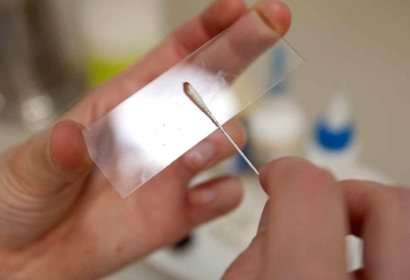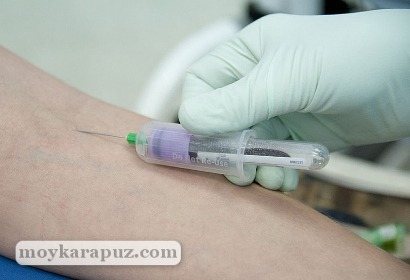One of the most important stages in the life of every family is the birth of the first child. And in order to ensure good health for the unborn child, parents need to be examined and take tests that are mandatory when planning a pregnancy.
It does not always happen in every family that pregnancy is planned in advance. But nowadays, more and more married couples are interested in this. And this is correct - after all, the health of the unborn child directly depends on the parents.
It is especially important to plan pregnancy for girls or women who have undergone gynecological diseases or surgical interventions.
IMPORTANT: both spouses/partners are involved in pregnancy planning, so they undergo examinations and tests together.
First of all, mandatory tests are taken and an examination is carried out. Secondly, additional ones may be prescribed related to genetic diseases, lifestyle and poor results of the first tests.
Planning a pregnancy
Important tests when planning pregnancy

Preparing for conception is a very important period in the life of a woman and a man.
A long time (preferably 3-12 months) before the planned conception, they should take care of their health, start eating right, engage in moderate physical activity, give up bad habits, visit the right doctors and pass all the tests.
What tests to take when planning pregnancy
Vaginal flora smear

The study will show the presence of pathogenic bacteria in the mucous membrane of the cervical canal and vagina and their quantity.
Cytology smear (PAP test)
The analysis allows you to determine the presence of atypical (malignant) cells in the cervical mucosa.
Smear for genital infections
Infections such as chlamydia, candidiasis, ureaplasmosis, mycoplasmosis, gonorrhea, gardnerellosis, papillomavirus, can be present in the body and occur in a latent form (asymptomatic). During pregnancy, they can cause miscarriage, early aging of the placenta, premature birth, developmental delay in the fetus and many other serious complications.
Before visiting a gynecologist for a smear test, you should adhere to the following requirements:
- abstain from sexual intercourse for 1-2 days;
- do not douche or use vaginal medications for 2 days;
- It is recommended to take a smear for flora immediately after menstruation, on the 5-6th day of the cycle;
- Before taking a smear, you should not urinate for 2-3 hours.
General and biochemical blood test
A blood test can help detect possible health problems. Blood is drawn on an empty stomach.
A biochemical blood test allows you to assess the condition of systems and organs in the body. It can show the presence of an inflammatory process, an imbalance of microelements, and a violation of water-salt metabolism. Before donating blood, you should not eat for 6-12 hours. You cannot drink milk, juices, sweet coffee and tea, you can only drink water.
Blood test to determine blood type and Rh factor
If a couple has different Rh factors, then during pregnancy a Rh conflict may occur (a condition in which the immunity of a woman with a negative Rh factor begins to produce antibodies to the red blood cells of the fetus with a positive Rh factor).
Blood test for infections
HIV, AIDS, Syphilis RW, Hepatitis B and C, which can cause malformations and congenital diseases in the fetus.
Blood test for the presence of antibodies to TORCH infections

During primary infection during pregnancy, they have a detrimental effect on all organs and systems of the fetus, especially the central nervous system. In addition, they can provoke miscarriage, premature birth, intrauterine fetal death, the development of defects, congenital deformities, developmental delay and many other complications. In most cases, any TORCH infection in a pregnant woman is an indication for termination of pregnancy. This is why it is so important to get tested for these infections before planning a pregnancy. They allow you to find out whether a woman has had these infections. If yes, then there is no need to worry, because the likelihood of re-infection is almost zero. If not, the doctor will advise you on a set of preventive measures. For example, if there are no antibodies to rubella, then it is recommended to get vaccinated 3 months before the expected conception. When it comes to toxoplasmosis, it is recommended to follow some rules to avoid infection as much as possible.
Blood test for hormones
Follicle-stimulating hormone, testosterone, progesterone, luteinizing hormone, thyroid-stimulating hormone, triiodothyronine - given if:
- I haven’t been able to get pregnant for more than a year;
- woman's age over 35 years;
- there is an irregular menstrual cycle;
- there are pronounced signs of increased levels of male hormones in the female body (increased body hair, acne);
- obesity;
- My last pregnancy ended in miscarriage.
Analysis of urine
A urine test will help detect acute and chronic diseases of the genitourinary system, which during pregnancy can negatively affect the health of the expectant mother.
Morning urine should be collected within 2 hours after collection. Before collection, be sure to carry out all necessary hygiene procedures. Collection is carried out in a disposable container, which can be purchased at a pharmacy.
Not only women, but also men need to get tested before planning a pregnancy!
Purpose and principles of examination
PCR testing is included in the list of mandatory tests during pregnancy
As noted above, the main task of the PCR test is to detect some infection in the body of the mother and fetus, respectively.
For pregnant women, this diagnosis is prescribed either routinely (2-3 times during the entire period of gestation), or if the development of infectious pathologies is suspected.
The latter include:
- any viral diseases (from relatively mild herpes to HIV infection)
- many bacterial pathologies (Helicobacteriosis, salmonellosis, tuberculosis, etc.)
- almost all fungal infections of the body (candidiasis, trichomoniasis, etc.)
By correctly conducting a test and analyzing the results of PCR, a professional doctor can easily identify pathologies of many systems of a pregnant woman’s body. Thus, often an analysis of this kind, carried out during pregnancy, makes it possible to diagnose the onset of ailments of the respiratory tract, genitourinary system or digestive organs in the expectant mother.
For pregnant women, PCR tests play a significant role, this is due to the fact that infectious pathologies present in the mother can be easily transmitted to the fetus.
Naturally, such a combination of circumstances is extremely dangerous and unacceptable, so monitoring this aspect of the pregnancy is very important. Taking this into account, we strongly do not recommend that expectant mothers ignore PCR.
The subject of PCR diagnostics is always human biomaterial
Often, the basis of the analysis is urine, blood or a smear from the reproductive system, and less often, cerebrospinal fluid. Preparation for collecting biomaterial should always be carried out, since the accuracy of the examination depends on it.
The list of preparatory measures varies slightly for different types of tests, but in any case includes:
- abstinence from alcohol 1-2 days before the test
- Diagnostician's warning about medications taken
- restriction of smoking 3-4 hours before taking biomaterial
- maintaining as healthy a diet as possible a few days before the test
- restriction from psycho-emotional and stressful stress, at least half a day before diagnosis
The noted preparation is slightly expanded when choosing a specific type of PCR sample. Thus, when donating blood for analysis, it is necessary to collect biomaterial strictly on an empty stomach in the morning, and when taking a smear from the genitourinary system, it is important to refrain from sexual intercourse a day before the diagnostic procedure. A pregnant woman can learn more about preparing for a PCR test directly from her supervising doctor. You shouldn’t be afraid to ask questions of this kind.
The test itself is carried out in three stages:
- Preparation expressed in the conversation between the diagnostician and the woman being examined.
- The collection of biomaterial is carried out in a certain sequence and depends on the selected formation of PCR analysis.
- Sending the collected material for analysis to the laboratory and generating the results.
As a rule, it takes from 2 to 4 days to implement the noted stages, after which the finished examination results are sent to the doctor observing the pregnant woman or given to her personally for decoding.
When decoding the analysis, the result may be detected or not detected
The PCR test performed during pregnancy has a general focus. As a rule, it is used to detect a limited number of infections, which necessarily include:
- toxoplasmosis
- trichomoniasis
- candidiasis
- chlamydia
- mycoplasmosis
- ureaplasmosis
- gonorrhea
- herpes
- cytomegalovirus infection
- hepatitis
- HIV
Other types of injections are also detected by analysis, however, to accurately determine them, it is necessary to carry out extended PCR.
In general, the results of the diagnostics in question are not difficult to consider in general. They often contain two main points:
- Whether there is an infection in the mother’s body or not.
- If so, what type of formation is it, how serious is it, and the like.
Naturally, consideration of the second aspect of the results is a matter for professionals, but the first aspect can easily be handled by the pregnant woman herself. Taking this into account, you should not abuse the results of the PCR test for the purpose of self-medication.
It is much more competent and rational to check these, but to make the final decision regarding the need to take specific measures, leave it to a professional. Do not forget that what is at stake is not just the health of a pregnant woman, but also the health and even the life of the fetus she is carrying.
What tests to take when planning
A joint visit to a fertility specialist is necessary for both spouses, especially the future father. It is male genes that in the early stages are responsible for normal cell division, the formation of systems and organs. The list of required studies for the husband will be much smaller.
At the initial stage, a woman visits a gynecologist. The condition of the reproductive system is assessed, and a smear is immediately taken to determine the microflora. It is this analysis that allows us to identify hidden infections, the presence of sexually transmitted diseases, as well as conditions that precede oncology.
Examination of a couple when planning pregnancy:
- clinical blood test - hemoglobin level is determined, compliance with blood cell content standards;
- blood chemistry;
- blood test for Rh factor, group;
- general urinalysis - allows you to detect inflammation and chronic conditions.
The patient will also need to pass:
- blood clotting test helps prevent bleeding in the future;
- scraping from the cervix;
- hormonal markers;
- ultrasound examination of the genital organs, thyroid gland, mammary glands.
These tests must be taken when planning a pregnancy in order to get an overall picture of the state of the woman’s reproductive system, readiness for conception and pregnancy. An expanded list may be prescribed if the patient has undergone operations related to the genital organs, there have been miscarriages, developmental arrest, or ectopic pregnancy.
Couples with a history of chronic diseases of systems and organs, if conception has not occurred for more than a year, also need additional examination.
List of necessary tests for women before pregnancy
It is necessary to prepare for pregnancy even before conception, because this will help to avoid many possible complications. If you want to have a baby, first of all go to the hospital and get the following tests:
- Consultation with a gynecologist. He will conduct a full examination. Using a cytological smear and colposcopy, the doctor will check the condition of the cervix. He should also check if you have any inflammatory or infectious diseases. To do this, a flora culture is taken and PCR diagnostics of infections (herpes, HPV, chlamydia, ureaplasmosis, etc.) is carried out. If any disease has been detected, conception will have to wait until complete recovery.
- Ultrasound. On the 5-7th day of the cycle, the general condition of the pelvic organs is checked, on the 21-23rd day - the condition of the corpus luteum and the transformation of the endometrium.
- General blood and urine tests, biochemical blood test.
- Blood test for hormones. In each individual case, the doctor determines at what period of the cycle and for which hormones it is necessary to be tested.
- A hemostasiogram and coagulogram will help determine the characteristics of blood clotting.
- It is necessary to determine the blood type and Rh factor of both women and men. If a man is Rh positive and a woman is Rh negative, and there is no titer of Rh antibodies, Rh immunization is prescribed before conception.
- It is important to check the female body for the presence of TORCH infections (toxoplasmosis, rubella, cytomegalovirus, herpes). If at least one of these infections is present in the body, it will be necessary to have an abortion.
- It is necessary to check the factors of miscarriage. To do this, you need to take a blood test for antibodies .
- A blood test for HIV, syphilis and hepatitis C and B is mandatory .
- Last, but not least, is a consultation with a dentist . After all, infections in the oral cavity negatively affect the entire body. In addition, during pregnancy it will be much more difficult to carry out dental procedures, because pregnant women cannot take any painkillers or have x-rays done.
We have listed for you a basic list of tests and procedures. But in each individual case it can be expanded or reduced.
Mandatory tests
In addition to general studies, spouses need to donate blood for infections. It is necessary to find out what viruses the future parents’ bodies have already encountered, and what dangerous diseases they lack immunity to.
What tests for infections need to be taken:
- blood test for syphilis (RW), a false positive result can be affected by diabetes, malignant tumors, hepatitis;
- blood test for HIV, repeated after six months;
- blood tests for hepatitis B and C;
- The doctor also recommends donating blood to determine antibodies to rubella, toxoplasmosis and other diseases dangerous to the viability of the fetus.
At the planning stage, 2 markers are given separately to determine rubella. If IgM antibodies are detected as a result, it means that immunity is in the formative stage; you need to take the test again after 90 calendar days.
If IgG is detected, rubella is in the latent stage and does not threaten pregnancy. In the absence of antibodies, the only way to avoid a disease that provokes congenital pathologies in the fetus is vaccination. After vaccination, 3 months must pass before the planned conception.
No less important is the analysis for toxoplasmosis, which is carried by domestic animals. In the absence of the body's protective abilities, spouses are strongly advised to avoid contact with carriers.
Cytomegalovirus is determined by the state of the blood, leads to developmental abnormalities, and the risk of death of the child remains after birth. It is transmitted in various ways, including airborne droplets, sexual contact, and through personal hygiene items. If elevated levels of immunoglobulins are detected, treatment consists of deactivating the virus, strengthening the immune system, and pregnancy planning should be postponed for a while.
Both spouses, especially the man, need to undergo standard tests at the preparation stage. The onset of conception, the course of pregnancy, as well as immunity, the state of the nervous system, and the cognitive abilities of the child depend on the indicators of his health.
Hormonal examination
At the planning stage, both partners need to take hormone tests. The list is quite wide; the work of all systems and organs depends on the balance of biologically active substances. The gynecologist directs the couple to undergo examination by an endocrinologist, and the doctor can also evaluate the results.
Tests for which hormones a woman needs to undergo:
- estradiol - depends on the phase of the cycle, affects the readiness of the uterus for implantation of an amniotic egg after conception, is responsible for the growth of the endometrium;
- progesterone – ensures the viability of the embryo by suppressing the immunity of the mother’s body;
- follicle-stimulating hormone – ensures the maturation of the egg, without it fertilization is impossible;
- luteinizing hormone - also responsible for the ovulation process, the assessment is carried out in combination with other indicators;
- testosterone - deviations from the norm threaten after conception with miscarriage or arrest of embryo development;
- prolactin – associated with estrogens and thyroid hormones, affects lactation; before taking the test, it is not recommended to stimulate the mammary glands or have sex during the day;
- thyroid hormones – given to patients who have experienced miscarriage, are diagnosed with infertility, or experience irregular menstruation;
- Anti-Mullerian hormone is taken by women after 30 years of age to assess the number of follicles.
Men are recommended to take a testosterone test. Low content leads to problems in intimate life, reducing the likelihood of pregnancy. High concentration is fraught with emotional imbalance and problems with self-control.
The planning stage will allow you to assess the health of future parents and, if necessary, normalize the functioning of systems and organs. A conscious approach to pregnancy will help give life to a healthy baby.
Which doctors to visit when planning a pregnancy?
In addition to the necessary tests, you must undergo examination by the following specialists:
- Gynecologist
- Dentist
- Otolaryngologist
- Cardiologist
- Allergist
- Ultrasound of the thyroid gland
- Pelvic ultrasound
Other doctors may be added to the list, such as a therapist, urologist, geneticist and others. It depends on your state of health and predisposition to any diseases. Separately examine the lungs by doing fluorography, if this is already required in time.
What examinations and tests should be taken when planning a pregnancy?
There certainly comes a time in the life of any married couple when both partners are ready for the arrival of a baby in their family. However, you should not get down to business right away, because the body of both women and men may not be ready to give birth to a healthy child. Therefore, doctors strongly recommend that future parents undergo a comprehensive examination and pass all the necessary tests before planning a pregnancy to speed up conception and proper development of the fetus. What tests should be taken before planning a pregnancy? We have prepared a whole list for you.
What tests should a man take if a couple is planning a pregnancy?
A man must also pass some tests to ensure proper conception and the health of the unborn baby:
- blood and urine;
- determination of the Rh factor;
- TORCH infections;
- sexually transmitted infections;
- spermogram;
- testosterone levels by donating hormones;
- ECG to detect pathologies of the heart and blood vessels.
It is also recommended that the future father visit such specialists as a therapist, endocrinologist, psychologist and geneticist.
Before pregnancy, it is important to prepare your body well for pregnancy. This is necessary not only to preserve the health of the mother, but also for the successful development of the fetus and the birth of a full-fledged child. The more specialists a woman goes through, the calmer and safer she will feel throughout the entire stage of motherhood.
Especially for beremennost.net – Elena Kichak
Examination by a gynecologist and smear before pregnancy
Where should a woman start when planning a pregnancy? The first thing you need to start preparing for is a visit to the gynecologist .
The doctor will perform a visual examination, assess the condition of the cervix and genital tract, as well as the size of the uterus and ovaries. Without fail, the gynecologist will do a bacterioscopic examination of urogenital secretions and a cytological examination . Based on the results of this analysis, it will be possible to see whether there are infectious and opportunistic pathogens in the mucous membrane of the vagina and cervical canal.
Also, the gynecologist should take the following tests for infections when planning pregnancy:
- For human papillomavirus HPV 16,18,31,33,35,39,45,52,56,58,59,66 (highly oncogenic types) - scraping.
- Examination for chlamydia (by PCR method from the cervix).
These diseases are not dangerous for the average person and can be asymptomatic. However, they can cause a number of serious complications and pathologies in the unborn child.
Gynecological tests
- Medical examination . The doctor determines the presence of developmental disorders of the genital organs, the condition of the cervix, and the size of the uterus.
- Flora smear . The presence of infection on the vaginal mucosa (Gardnerella bacteria, Candida fungi) and the cervical canal is checked.
- Pap test . _ Allows you to detect atypical cells in the cervix, which are a signal of a precancerous condition. Cytological analysis allows you to detect cancer at an early stage.
- Smear for genitourinary infections . Pathogens such as ureaplasma, mycoplasma or chlamydia for some time do not show signs of infection, but obstruction of the fallopian tubes, infertility, miscarriage or premature birth, and mental retardation in the development of the baby are due to hidden pathogens.
Blood tests
The following blood tests need to be done
- general blood analysis;
- blood for antibodies Toxoplasma (Ig G), Rubella (Ig G);
- blood test for Hepatitis B and C (total antibodies);
- blood test for HIV and syphilis;
- coagulogram;
- blood glucose;
- prolactin test;
- thyroid-stimulating hormone (TSH) test;
- lipid profile (triglyceride, cholesterol, HDL, LDL, VLDL);
- lipid profile (cholesterol, triglycerides, HDL, LDL, VLDL, atherogenic coefficient); anti-muller hormone (AMH);
- blood test for homocysteine;
- antibodies to thyroid peroxidase (ATPO);
- blood test for vitamin D.
General and biochemical blood test
An invasive method of laboratory research that allows you to obtain information about the health status of potential parents, advanced screening of basic blood parameters and primary data on metabolism and deficiency of vital microelements. The results of the analyzes include data on the level of:
- glucose and urea;
- total lipids and non-protein nitrogen;
- cholesterol, phospholipids and triglycerides;
- bilirubin and protein.
The study will also help determine ESR, hemoglobin and the number of leukocytes, platelets and red blood cells. Patients can donate venous or capillary blood for general and biochemical analysis. The collection of biomaterial is carried out using modern materials and eliminates the risks of cross-infection.
Go to analyzes
General urine analysis and bacterial culture
This type of analysis will identify acute and chronic urinary tract diseases , which can have an extremely negative impact on the health of a pregnant woman.
To eliminate errors in diagnostic results, you must adhere to simple rules , which, by the way, will be useful throughout pregnancy:
- Morning urine is always submitted for analysis;
- for these purposes, days of menstruation should be avoided;
- Before manipulation, you need to wash yourself thoroughly;
- During the procedure, it is better to cover the vagina with a cotton swab;
- urine is collected in a special container or glass container.
During the planning period, you should not neglect the capabilities of ultrasound. Ultrasound of the pelvic organs allows you to: see the condition of the ovaries and follicles;
assess the condition of the endometrium (see what is the probability of accepting a fertilized egg); see if ovulation has already occurred or is expected in this cycle. In addition, the results of the study can reveal uterine defects , one of the most common of which is fibroids. Before pregnancy, such neoplasms may not manifest themselves in any way. However, they can prevent conception and cause miscarriage or premature birth. In this case, doctors recommend removing the fibroid and waiting 1-2 years before the next planning.
Also, to rule out non-gynecological problems, you need to undergo an ultrasound of the abdominal cavity, breast, thyroid gland and mammography.
Analysis of urine
This is the most common type of analysis, which has to be taken not only before the start of pregnancy, but also many times during gestation. It is better to immediately understand the recommendations for collecting urine in order to prevent erroneous results and, accordingly, repeated collection. The urine test should be timed to coincide with the period between menstruation. Errors in the results can be avoided if you donate morning urine within two hours after collection. Collection is carried out in a pharmaceutical container or clean glass container that does not contain traces of liquid residues.
Before collecting urine, a woman should wash her genitals, and then isolate the vagina with a hygienic tampon while collecting urine. Urine will be required for a general analysis, and less often for the Nechiporenko test. In any case, you need to collect a portion of medium urine (skip the first stream and the last). A negative urine test for genitourinary infections will protect the mother’s body from health problems during pregnancy.
Optometrist, dentist and therapist
In addition to the gynecologist, a woman should visit other specialists. So, the therapist will perform a general examination and perform an electrocardiogram.
It is imperative to inform him of all ailments in order to identify the problem in time and begin treatment. The ophthalmologist will evaluate the condition of your vision and eyeball, possible problems during childbirth, and prescribe treatment for problems.
Also, at the planning stage, it is advisable to visit the dentist and tidy up your oral cavity.
What tests should a man take when planning a pregnancy?
Despite the fact that a woman has to become pregnant, bear and give birth to a child, a man, on the recommendation of a urologist and therapist , must also undergo some examinations and tests, including:
- general blood analysis;
- blood for antibodies Toxoplasma (Ig G), Rubella (Ig G);
- blood test for Hepatitis B and C (total antibodies);
- blood test for HIV and syphilis;
- PCR for chlamydia, trichomonas, gonococci, mycoplasma, ureaplasma and gardnerella, viruses - herpes virus, human papillomavirus, cytomegalovirus, Epstein-Barr virus;
- general urine analysis;
- blood biochemistry;
- blood test for hormones;
- ECG and ultrasound of the chest, including the heart and abdominal cavity;
- analysis to determine blood group and Rh factor.
How is the expectant father examined?
It is difficult for men to be persuaded to undergo examinations before conceiving a child, but it is necessary to convince them that these procedures are necessary to ensure that the baby is healthy in the future. The maximum procedures a man should count on fits into a short list:
- General blood and urine tests, determination of blood group and Rh factor.
- It makes sense to donate blood for TORCH infection when a man has more than one sexual partner or uses a condom for a long time in his married life.
- If the fluorographic image is more than a year old, it is necessary to undergo fluorography.
- Sperm analysis when planning pregnancy is perhaps the most important. After deciphering it, it will become clear what the degree of possibility of sperm in fertilizing an egg is. If the spermogram is poor, medical, surgical or non-native treatment is sought.
- The contact test gives the final answer to the question “How possible is pregnancy for partners?” Both partners take the test, and the partner's fresh sperm and the woman's cervical fluid (fluid on the surface of the cervix during the maturation of the egg) are analyzed. If a woman's cervical fluid exceeds the threshold of aggressiveness towards sperm, fertilization may not occur.
The list of tests is not small, but the end justifies the means. After all, everyone wants to have healthy offspring?!
(voted: 3, rating: 5.00 out of 5)
Share the news on social networks
Ask a Question! You have questions? Feel free to ask any questions! And our staff specialist will help you. Go>>
Tags: tests, conception
- Recommended Articles
- Incompatibility of partners at conception
- Implantation bleeding after conception
- Blood group compatibility for conception
« Previous entry
Recommendations for preparing for conception
These are the recommendations that doctors advise you to follow so that conception occurs as soon as possible, pregnancy proceeds easily, and the baby is born healthy.
- Follow a healthy lifestyle. This means that you need to give up alcohol and cigarettes, play sports, and take walks in the fresh air.
- Particular attention should be paid to nutrition: it should be balanced and consist of natural and healthy foods. Go to the necessary doctors and take all the tests recommended for couples planning a child. Take a course of vitamin therapy.
- Particular attention should be paid to folic acid. It is advisable to consult a doctor before taking it.
- Avoid stress and heavy physical activity.










